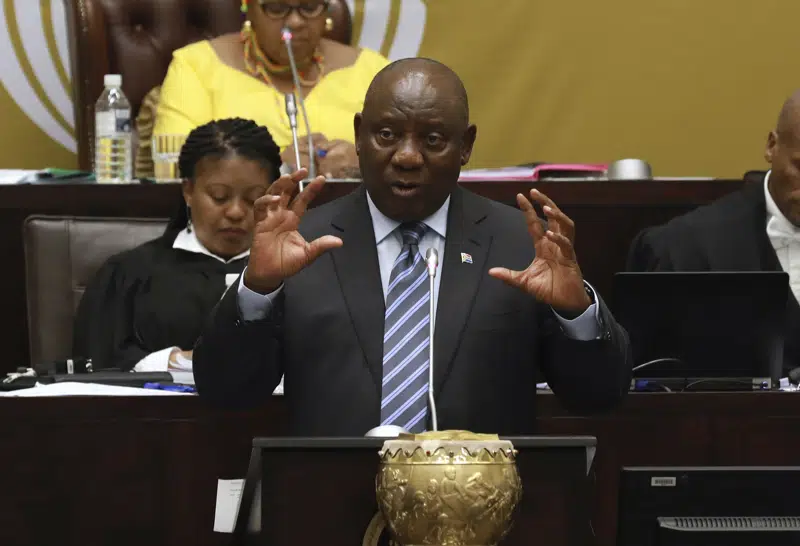Johnathan Paoli
Political parties have come out in support of the passing of the General Intelligence Laws Amendment Bill and said it would strengthen the State Security Agency and further provide authority to the office of the Inspector-General of Intelligence.
Chairperson of the ad hoc committee Jerome Maake on Tuesday said the General Intelligence Laws Amendment Bill, known as the Spy Bill will address shortcomings in the intelligence services and also address issues identified by the High Level Panel, chaired by Sydney Mufamadi, the Zondo Commission’s report and the judgment of the Constitutional Court to strengthen the work of the SSA.
“The General Intelligence Laws Amendment Bill seeks to implement the recommendations of the High Level Review Panel by undoing the SSA and creating distinct domestic and foreign intelligence services. It aims to enhance accountability, compliance with Constitutional Court judgments and regulation of intelligence services,” Maake said.
The General Intelligence Laws Amendment Bill was adopted by the NA after just four months and will separate intelligence services into foreign and domestic agencies.
The Bill aims to prevent the abuse of intelligence services, addressing concerns from the past administration, re-establishes the South African National Academy of Intelligence (SANAI) and provides a legislative mandate for bulk interception, compliance monitoring, and coordination of intelligence activities.
Maake said they wanted to create an intelligence service that was accountable, but at the same doing its work to ensure national security.
The SSA was a key component or structure of the state that was at the forefront of gathering intelligence, with the Bill expected to transform the intelligence landscape of the country, with the bill doing away with the SSA, and replacing it with the South African Intelligence Service and the SA Intelligence Agency, Maake said.
Maake said following the irregular establishment of SSA in 2009 the bill sought to address the resulting issues and challenges.
“The establishment of SSA through a presidential proclamation in 2009 was irregular, deviating from Constitutional requirements. Despite subsequent legislative amendments challenges persisted leading to the formation of the High Level Review Panel in 2018 to address issues within SAA,” said Maake.
DA MP Dianne Kohler Barnard came out in support for the bill and said following the repeated attempts by the standing committee on intelligence over the last eight years to have its tables, its acceptance in Parliament followed a public outcry due to its requirements of vetting churches and NGOs prior to operation.
Kohler Barnard said in addition to the removal of the controversial clause, the Bill further sought to reverse egregious activities of the past when domestic and foreign intelligence had been irregularly lumped together.
After the outcry the controversial clauses were removed from the Spy Bill.
She said the ad hoc committee has managed to ensure that the Inspector-General of Intelligence would be able to appoint his own staff and not the SSA.
“The committee members had read in the newspapers how church heads and heads of NGOs would now have to undergo some sort of security vetting and obtain a so-called security clearance certificate,” Kohler Barnard said.
She said there was no indication what this would entail or what would happen to NGO heads or heads of the church if they fail to obtain such a certificate and subsequently the committee has removed every single threatening constitutional phrase in the bill.
The EFF supported the Bill, with MP Mbuyiseni Ndlozi saying it has addressed some of the key questions, despite being rushed through Parliament.
EFF MP Mbuyiseni Ndlozi also said the Spy Bill was rushed through Parliament.
“The Mufamadi report, which served as the initial basis for this bill, has been part of public record since 2018. You await until the final hour in terms of this term of office for the bill of this magnitude, rushed through processes at the time of serious electoral contestation is opportunistic to say the least,” Ndlozi said.
Opposition parties have praised the bill as securing the autonomy of the Inspector-General of Intelligence and this would ensure a strengthening of its oversight responsibilities over the intelligence gathering mechanisms.
In addition, the EFF said it wants the findings of the Inspector-General to be binding, and welcomed the fact that the SSA will now be split into a domestic and foreign branch of intelligence.
Parliament approved the Bill, with chairperson Madala Ntombela saying it will now be referred to the National Council of Provinces (NCOP) for concurrence.
INSIDE POLITICS

